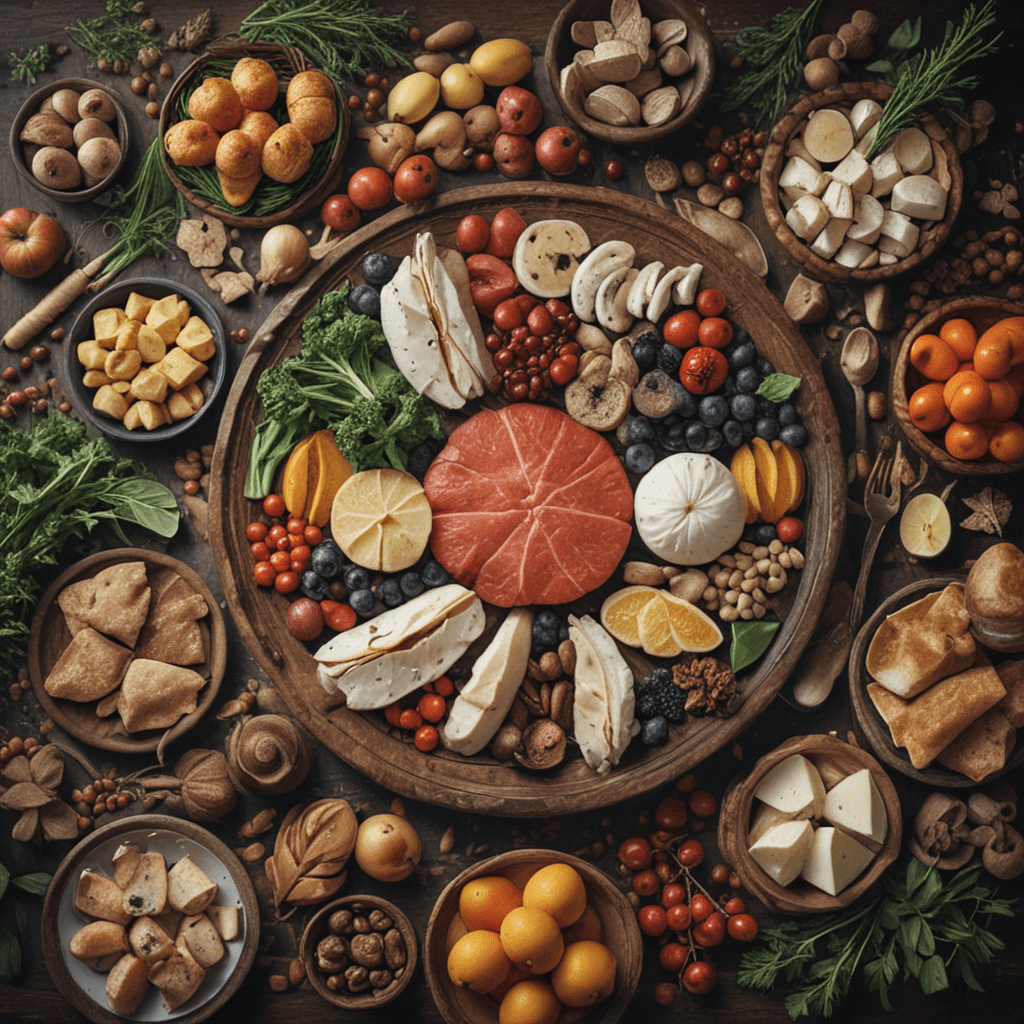The Influence of Finnish Mythology on Traditional Food
1. Introduction
Finnish mythology has played a pivotal role in shaping the food practices and beliefs of Finnish culture. The beliefs and narratives woven into Finnish mythology have left an enduring imprint on the traditional Finnish cuisine, influencing everything from the choice of ingredients to the rituals surrounding food consumption. This article delves into the profound influence of Finnish mythology on traditional Finnish food, exploring the ways in which myths and legends have shaped the culinary landscape of Finland.
2. Food as a Reflection of the Divine
In Finnish mythology, food held a sacred significance, considered a gift from the gods and imbued with supernatural powers. The gods were believed to have given humans the knowledge of food production and preparation, and certain foods were associated with specific deities. For instance, Ukko, the god of thunder, was believed to favor barley, while Ahti, the god of water, was associated with fish. Food offerings were made to the gods to seek their favor and protection, and it was believed that consuming certain foods could bestow blessings or avert misfortune.
3. Food as a Means of Communing with Nature
Hunting and fishing played a crucial role in traditional Finnish cuisine, and these activities were deeply intertwined with mythological beliefs. The forest and its inhabitants were seen as sacred, and hunting was considered a sacred act. Animals were believed to possess spirits, and hunters would often apologize to the animal’s spirit before killing it. Fishing was also regarded as a sacred activity, and specific rituals were observed to ensure a successful catch. The abundance of wild berries and mushrooms in the Finnish forests further emphasized the importance of foraging in traditional Finnish cuisine.
4. Food as a Ritualistic Practice
Food played a central role in Finnish festivals and ceremonies. Ritual meals were held to mark important events in the life cycle, such as weddings, births, and funerals. These meals were believed to strengthen the bonds between family and community members and to connect them with their ancestors. Food sacrifices were also made to appease spirits and ensure their goodwill. For example, milk was offered to the spirits of the dead at funerals to guide them on their journey to the afterlife.
5. Supernatural Food Beings
Finnish mythology is replete with supernatural food beings. These beings, such as the Nisse, a mischievous house spirit, were believed to influence food production and consumption. It was said that the Nisse could help with churning butter or protect the livestock, but could also cause trouble if not treated with respect. Belief in food spirits persisted for centuries and shaped many traditional food practices.
6. Traditional Finnish Food Ingredients
The choice of ingredients in traditional Finnish food was heavily influenced by mythological beliefs. Sacred plants, animals, and herbs were associated with specific gods or spirits. For instance, rye bread was considered a sacred food associated with Ukko, the god of thunder. Oats were believed to bring good luck, while juniper berries were used to ward off evil spirits. The use of natural and unprocessed ingredients was highly valued, as it was believed that food in its natural state retained its spiritual power.
7. Food Preparation Techniques
Traditional Finnish food preparation methods were also rooted in mythological beliefs. Myths prescribed the proper way to handle, cook, and preserve food. For example, it was believed that iron cookware should not be used to cook fish, as it would anger the water spirits. Food was often cooked over an open fire, which was seen as a symbol of purification and protection. The use of smoke and fermentation in food preservation was also influenced by mythological beliefs, as these methods were believed to enhance the food’s spiritual properties.
8. Food Consumption and Etiquette
Dining customs and behaviors in Finnish culture were shaped by mythological teachings. Taboos and superstitions surrounded food consumption, such as the belief that it was unlucky to leave food on one’s plate. Communal dining was considered important, as it was believed to strengthen the bonds between family and community members. It was also customary to offer food to strangers and guests, as it was seen as a sign of hospitality and respect.
9. Food in Finnish Proverbs and Idioms
Mythological beliefs are reflected in Finnish proverbs and idioms, which often convey cultural values and beliefs related to food. For instance, the proverb “Älä laita kaikkia munia samaan koriin” (Don’t put all your eggs in one basket) reflects the importance of moderation and risk aversion. The idiom “Olla kuin kala vedessä” (To be like a fish in water) signifies someone who is comfortable and at ease in a particular situation. These proverbs and idioms provide insights into the enduring influence of Finnish mythology on the Finnish psyche.
10. Conclusion
Finnish mythology has had a profound and lasting impact on traditional Finnish food practices and beliefs. From the choice of ingredients to the rituals surrounding food consumption, mythological narratives have shaped the culinary landscape of Finland. The sacred significance of food, the importance of communing with nature through food, and the belief in supernatural food beings have all contributed to the unique and rich tradition of Finnish cuisine. Understanding the influence of Finnish mythology on food provides a deeper appreciation for the cultural heritage and values of the Finnish people.
FAQs
Q: What are some examples of sacred foods in Finnish mythology?
A: Sacred foods in Finnish mythology include rye bread, oats, juniper berries, and honey.
Q: How did hunting and fishing play a role in Finnish food practices?
A: Hunting and fishing were considered sacred activities, and animals were believed to possess spirits. Hunters and fishermen observed rituals to ensure a successful catch and to show respect to the animals.
Q: What is the significance of communal dining in Finnish culture?
A: Communal dining was important in Finnish culture as it strengthened bonds between family and community members. It was also customary to offer food to strangers and guests as a sign of hospitality.
Q: How is Finnish mythology reflected in Finnish proverbs and idioms?
A: Finnish proverbs and idioms often convey cultural values and beliefs related to food, such as the importance of moderation and the comfort of being in a familiar environment.



